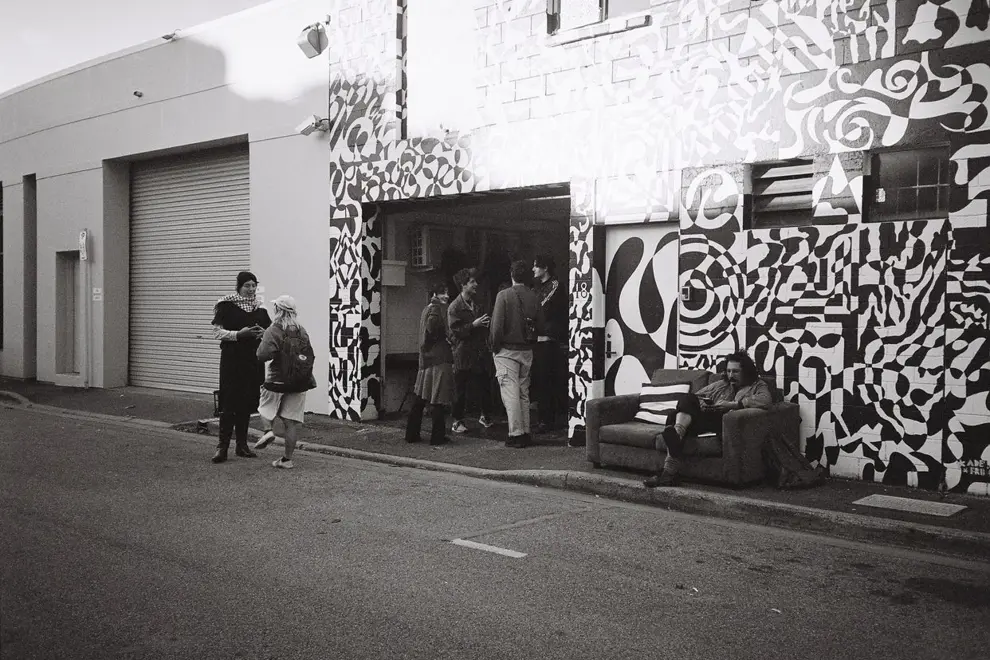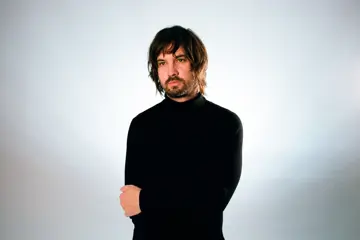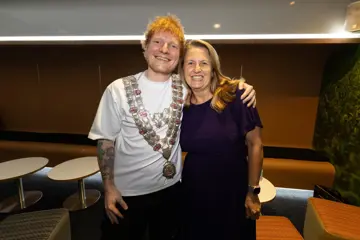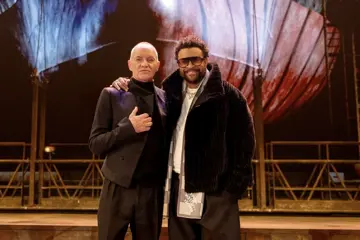Gunston Street is tiny, a pocket-sized strip that lurks behind a string of bustling cafes that cater to the corporates in the eastern half of the Adelaide CBD in desperate need of a double-strength oat latte on their lunch breaks. Easily missed, overshadowed by the neighbouring main road.
Once on Guston Street, however, interim recording studios, with its psychedelic monochrome exterior—a mural designed by artist Hari Koutlakis—is impossible to miss. It is a wide building with an overhead rolling door and a few windows set against the distinctive marbled pattern, and an old sofa that hints at artists’ smoke breaks is planted on the curb in front of it.
Interim recording studios, as is put so succinctly on its website, is “a place to make music in the Adelaide CBD.” It is a mutli-disciplinary space, specifically “an artist focused hybrid analog digital recording studio” with a mouth watering range of technical equipment, available for engineered sessions and dry hire, where “all are welcome.”
I sat down in the interim control room with house engineer Matt Schultz and studio co-owner and co-manager Hamish Gibson-Smith, all three of us sipping our identical takeaway long blacks from the cafe bar across the street.
Don't miss a beat with our FREE daily newsletter
They talk me through the genesis of interim as a business and organisation. Hamish mentions a good friend of his, Colby Robertson, who was a house engineer before Matt was involved and also co-owns the studio. “He started working here when he was, like, 18, with the previous owner and kind of worked his way up to running his own job.”
He explains that during the height of the coronavirus pandemic, he was living with Colby and the indie musician Jess Johns, and they started to discuss how the previous owner “didn’t seem very invested” in the studio and was “fucking up left right, and centre.
“I just said, why don’t we try and buy it off him?” Hamish mimics all of his housemates, answering in the affirmative, brimming with enthusiasm. “And then two months later, we bought it.” Discussions occurred, money changed hands, and the place was suddenly, dauntingly, theirs. “It was not something any of us really saw coming.”
Matt moved into the space about two years ago now, taking over on the engineering side of things when Colby moved interstate to work for triple j. Hamish and Matt manage to balance out the responsibilities of the space between each other well, sharing admin duties and focusing their energies on their respective talents. For Matt, this is primarily engineering and technical duties, and for Hamish, this is liaising with tenants and coordinating the miscellaneous exciting events that are hosted by interim.
The two are enthusiastic about their goals. “I think we're trying to make the space as inclusive as possible while also trying to churn out the best music we can. And we want it to be a place of fun,” Hamish says.
Matt agrees - he wants the events they run to be enjoyable and safe for all who attend. But making the studio experience enjoyable for the bands who come in to record with them is especially crucial to him. As a musician himself - a guitarist in The Empty Threats and Twine - it is personally important to him to make the recording process something that musicians can look back on fondly, being able to forge “a nice association to their own music.”
It can be easy for young artists to feel exploited or to be wary of trusting anyone with the art that they have put so much of themselves into. But Matt wants them to know that interim is “quite a safe space to explore ideas. I think in my experience, when I was first recording stuff, it was very scary.” But his history of having been on both sides of the experience could potentially help “emerging artists feel more comfortable. And,” he adds, grinning, “we’ve got really cool gear.”
Hamish, too, is keen for emerging artists to experiment with them. “Come and have a go!” he cries good-naturedly. “Come and have a crack!” They both reiterated that they are “definitely” hosting a very welcoming space for younger artists of all ranges and backgrounds.
Together, they aim to develop an interim into the “music culture hub” of Adelaide. “And that’s not a quick thing,” Hamish admits. “It takes a long time, years and years of cultivation, being here and doing good things.” But they both seem to be imbued with the patience to see it through.
They are keen to continue to foster what is already growing here in Adelaide. Matt feels that up-and-coming artists are more inspired by “the urge to try a variety of different things” compared to other artists in larger, more industry-savvy states. “It’s exciting to me.”
“I love the little pockets,” Hamish adds, referring to the little microcosms within the overarching Adelaide scene, the bands and artists that form rapports with each other and start to work together to create exciting new things and spaces. “I love seeing that come together.”
While still harbouring affection for what is being created in Adelaide, they both want to work to improve certain elements of the scene.
“Sometimes I feel there's not enough push,” Matt suggests timidly. “There's not enough healthy competitive drive. And it doesn’t quite push artists far enough or quick enough.” This can lead, in his opinion, to the output of music in general being “quite slow” from Adelaide-based bands.
He expands on the potential reasons for this. “I think people are measuring success on touring a lot more than before, and touring’s so fucking expensive. There's just so many costs that have just hiked up, and the gig fees are the exact same. I think people are kind of just prioritising differently, and I hope it shifts back to a good happy medium of having material to release and show people.”
Hamish emphatically agrees. “It does feel a bit like the music is a secondary product behind being a band.” Things like a social media presence and constant touring appear to be the first priority these days, he says. “[It] feels really strange to me.”
Matt adds, “If an Adelaide band is going down the industry mindset, it often seems like the template for musicians is just, go to Melbourne.” Of course, he feels that there is a place for that path, but he wants artists to know that that is not the only option. He even “hopes to entice people” to travel from interstate to engage in art here in Adelaide. “So it's not so much like everyone wants to leave, but like people want to come here.”
Interim does already have a history of occasionally working with interstate bands, such as with alt-indie artist Honeybeam, who is based in Melbourne - a history they would love to expand on. They are, however, very proud of all the Adelaide-based bands they have worked with more recently, such as Colourblind, Concrete Surfers, Dead Roo, short snarl, and Placement, among others.
They are also sitting on some exciting, imminent album releases. With delight, Matt reveals how all of the upcoming Twine full-length debut was tracked at interim, as well as some tracks for War Room’s unreleased debut album, and that they are even just “finishing off” the latest The Empty Threats album.
There is much to watch out for over the next few months when it comes to interim’s involvements, but they are hungry for more, always looking for new opportunities, new people to collaborate with, new things to make - and they want everyone to know.
You can get in touch with the interim studios here.
This piece of content has been assisted by the Australian Government through Music Australia and Creative Australia, its arts funding and advisory body
















